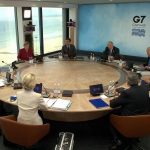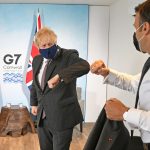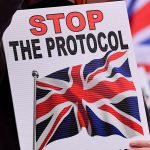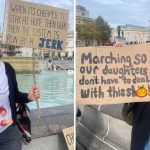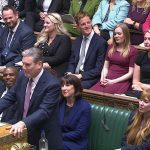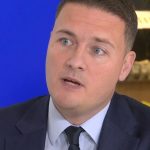Boris Johnson is just a few hours into to his marathon two-day hearing at the COVID inquiry and already a lot of ground has been covered.
Here at the key points at a glance:
Johnson COVID evidence live: Former PM admits Number 10 got ‘very frazzled’ as COVID ‘kept coming’
Johnson apologises – but it doesn’t go down well with bereaved families
As expected, given it was trailed in the press (much to the inquiry’s displeasure) the former prime minister began with an apology “for the pain and loss and suffering” caused by the pandemic. He acknowledged that “unquestionably” his government “may have made mistakes” in its handling of the crisis and said he hoped the inquiry could provide answers for victims and bereaved families.
The statement was interrupted by four women, all who lost loved ones during the pandemic, holding signs saying “the dead can’t hear your apologies”. They were removed from the inquiry and said they didn’t want his “waffle”.
He accepts personal responsibility for all decisions – but won’t be drawn on specific mistakes
Mr Johnson was pressed on what mistakes he was referring to in his opening statement and said this was “broadly around messaging and particularly different messaging coming from Number 10 and the devolved administrations”. He said this was something to be “sorted out in the future” but when pressed on whether this was the “main mistake” he said he would struggle to give a hierarchy and it would be easier to “explain what happened as we go”.
However, he said he takes “personal responsibility for all decisions made”, including the timing of the multiple lockdowns and the “explosion” of the virus in care homes.
‘Strong arguments against early lockdown’
On the timing of the first lockdown – which previous witnesses said should have come sooner that 23 March – Mr Johnson said there were “strong arguments against going too early”, including the the issue of “behavioural fatigue” and “the risk of bounce back”. He said the arguments were “made powerfully and they certainly had a big effect on me”, but stressed decisions like this, although made by him, were subject to “exhaustive cabinet discussions”.
Please use Chrome browser for a more accessible video player
Johnson disputes excess death statistics
Back to the issue of mistakes, Mr Johnson was pressed repeatedly on whether the government’s response led to more excess deaths, with inquiry counsel Hugo Keith KC pointing out that the UK had the second highest rate in western Europe after Italy. The former prime minister disputed those statistics repeatedly, saying he has seen figures showing the UK “well down the European table and even further down the world table”.
He said an “extremely elderly population”, a high rate of “COVID-related morbidities” and high population density also influenced the death rate. Asked again whether government actions materially affected the outcome, Mr Johnson said: “The answer is I don’t know.”
Read More:
No 10 had ‘unbelievably bullish’ approach to pandemic and thought UK ‘would sail through it’
Matt Hancock: UK should have locked down three weeks earlier
Inquiry told 5,000 WhatsApp messages missing
The inquiry also heard about 5,000 WhatsApp messages on Mr Johnson’s phone from 30 January 2020 to June 2020 were unavailable to the inquiry. Mr Keith KC said a technical report provided by the former Tory leader’s solicitors suggested there may have been a factory reset at the end of January 2020 followed by an attempt to reinstate the contents in June 2020, but Mr Johnson denied knowledge of that.
He said he had made plain during the legal battle between the Cabinet Office and the inquiry that his messages should be disclosed.
Be the first to get Breaking News
Install the Sky News app for free
Johnson plays down toxic culture but admits it was ‘male dominated’
Much of the questioning this morning centred on previous claims of a toxic culture of disarray and incompetence. Mr Johnson admitted his Number 10 was “too male dominated” but he played down some of the inflammatory language contained in released WhatsApp messages, insisting any other administration under similar pressures would have behaved in the same way.
He said he wanted “an atmosphere of challenge with some strong characters giving me advice, and I valued that advice” and that he wasn’t aware that civil servants did not want to join the Number 10 team because of the wider culture. However, he told the inquiry: “I think that the gender balance of my team should have been better.”



